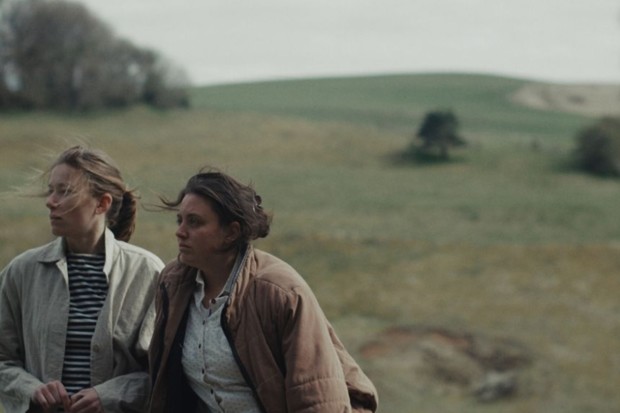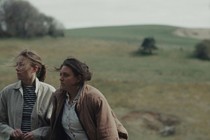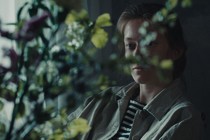LOCARNO 2023 Cineasti del presente
Crítica: A Good Place
por David Katz
- El premiado film de Katharina Huber es una mirada, con cierta luz de ciencia-ficción, hacia una deteriorada comunidad en una zona montañosa de Alemania, y a las dos jóvenes que resisten en ella

Este artículo está disponible en inglés.
The Locarno Film Festival’s programming contains a preponderance of “play”; perhaps audiences and film critics can make excuses for less fully realised work on this basis. But it’s the best route into grasping the power of Katharina Huber’s feature-length fiction debut, A Good Place [+lee también:
tráiler
ficha de la película], which premiered in the Cineasti del presente section, and then went home with the Best Emerging Director and Best Performance Awards (see the news). It’s a work of contradictions and paradoxes: the tone is solemn, but the finer points of the shrouded plot are, to use a Briticism, pretty crackers; the rhythm is patient, but story events stream forward before the audience can catch their breath and orientate themselves. And it’s clearly set in a locale populated by linguistic polymaths, who converse solely in German, but whose listening preferences are vintage British radio broadcasts (the sort that might have been sampled in eerie 1990s chill-out electronica).
We’re thankfully clear of both the COVID era and also COVID-restriction cinema, but this film’s production genesis in 2021 also provides context. We’re in a mountainous farming village somewhere in Germany, where we alight on two households: one of what seems to be an entire extended family, and the other of a young couple. Grounded reality seems to end there, however: the food source seems to solely be chickens, which are bred and then slaughtered; a mysterious disease is spreading, causing the inhabitants to die or merely disappear; and a space rocket is set to be launched, with space exploration and maybe colonisation the salve to this morass. Whatever else can be said, Huber has distilled many contemporary concerns and anxieties here, particularly those of wired-in millennials.
With this backdrop established, we follow Güte (Clara Schwinning, the Best Performance Award winner) and Margarita (Céline De Gennaro), women in their early twenties from the aforementioned households. As the rest of the village falls ill around them, they seek their own relief and liberation, not to mention from the abusive and accurately named Wolf (Jannik Mioducki), a swarthy young man who courts both of them.
The uncanny achievement of A Good Place is conveying this information via two alienation effects: through the utterly placid temperament of the village and its attendant, slow way of life, where there’s little material hint that this is all taking place in a speculative reality; and in Huber’s own strategy – in her capacity as the film’s editor – of removing as much from the diegesis as possible whilst still allowing it to (barely) make sense. Its shattered and oblique découpage evokes Angela Schanelec (now a touchstone influence for young German directors), but turn it on its side, and we have the novel Gravity’s Rainbow, as its descending-order chapter headings count 10, 9, 8, 7 towards a climactic rocket detonation, and Jacques Rivette, with the co-conspiratorial female characters, and magic crystals that delightfully show up in the second act.
Whilst all this meaning only emerges patiently (and perhaps with the assistance of further viewings), the atmosphere is seductive enough to captivate the audience and bring us to a surprising place of pathos as the on-screen captions reach “1”. A fully independent German production, A Good Place deserves to travel further following its acclaimed Locarno bow; experimental, deconstructed narrative cinema this convincing is a rare thing.
A Good Place is a German production, staged by ACKER film.
(Traducción del inglés)
¿Te ha gustado este artículo? Suscríbete a nuestra newsletter y recibe más artículos como este directamente en tu email.


















